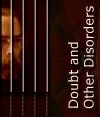'Tom'
Doubt is thought's despair; despair is personality's doubt. . .; Doubt and despair . . . belong to completely different spheres; different sides of the soul are set in motion. . . Despair is an expression of the total personality, doubt only of thought. -
Søren Kierkegaard
|
"Tom"
The first genuine OCD experience that I can remember happened to me when I was about 6 years old. It happened one morning when I was walking to school and daydreaming. For some reason the topic of God was on my mind (my family was devoutly Christian); I was thinking about how we always said we loved God in Sunday school. All of a sudden a thought popped in my head, like a little voice daring me to say the words "I hate God". So I thought the words in my head, "I hate God". I immediately became anxious because I knew that I didn't hate God, the words had just popped into my head without my control. I tried to just shake it off, but the words just kept coming: "I hate God", I hate God". I started to get really anxious as I was thinking, "Stop it! Why am I saying that? I love God!" So I forced myself to say in my head "No, I love God", but it didn't help. The words just kept coming and coming and coming, "I hate God", "I hate God". I was fighting back the tears because I was really scared that God could hear me. When I got to school I was really shaken from what had happened. I tried to forget it, but for the rest of the day it was stuck like a splinter in the corner of my mind. When I got home I ran to my mother and tried to explain to her what had happened. I was in tears I was so upset. I tried to explain to her that I couldn't stop saying "I hate God" and was trying to counteract it by saying "I love God". I can still see the perplexed look on her face as she regarded me. I could tell that she knew I was in pain but had no idea why. She told me that it was alright and that I shouldn't worry about it. She comforted me by saying "I know you love God, it's okay". Even though I was only 6 years old, I had a feeling that I was being placated (obviously not in a way I could articulate then, but in retrospect, I think I knew). That's where my self-esteem took a down-turn as I became increasingly aware of how different I was.
I wasn't diagnosed with OCD until 16 years later in my senior year in college. I'd like to think that if I'd been diagnosed earlier those 16 years in between wouldn't have been fraught with such agony. How can you raise a child to be a healthy, well-adjusted individual when his/her mind is broken (and neither you nor the child is aware of it)? You try to reason with the child and understand his/her reality, but the responses just don't make sense. If I had just been taught to separate out what is and is not reasonable in my thoughts, I think a lot of my pain could have been avoided (or at least softened). But that's life, and all you can do is work to heal yourself now. It's taken me two years of therapy and medication to finally rise above the trees. Now I've gotten a better view of where the OCD ends and I begin. The way I look at it, everyone has a gift and a wound. One of the many challenges in life is to find people who won't merely flatter you when they see your gift, and who won't run away when they see your wound. OCD is a really tiring, frustrating, and painful wound, but it's just a wound. Try to push it aside and embrace your gift, you'd be surprised what can heal with effort over time.
I am not a doctor, therapist or professional in the treatment of CD. This site reflects my experience and my opinions only, unless otherwise stated. I am not responsible for the content of links I may point to or any content or advertising in HealthyPlace.com other then my own.
Always consult a trained mental health professional before making any decision regarding treatment choice or changes in your treatment. Never discontinue treatment or medication without first consulting your physician, clinician or therapist.
Content of Doubt and Other Disorders
copyright ©1996-2009 All Rights Reserved
next: Hillary'
~ ocd library articles
~ all ocd related disorders articles
APA Reference
Gluck, S.
(2009, January 9). 'Tom', HealthyPlace. Retrieved
on 2026, March 3 from https://www.healthyplace.com/ocd-related-disorders/articles/tom

